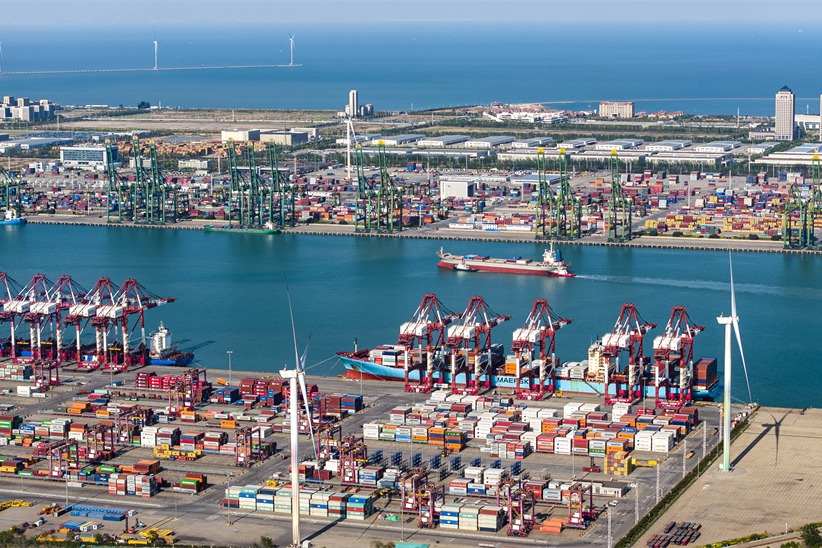Chengdu Report: Pandas, hotpot and more in Sichuan capital

| A glance at the Dujiangyan scenery area. Dujiangyan is the world's oldest water control project. Provided to China Daily |
The recently concluded Chengdu-London Week attracted a number of British residents, who enjoyed opera performances, tea ceremonies and panda figurines.
During the event people also learnt about the new 72-hour visa-free policy.
Chengdu's rich culture and abundant history make it a tourism magnet in Southwest China.
A trip to the city allows visitors to learn about Chinese culture, history and philosophy through its many cultural resources.
Since the start of the 72-hour visa-free policy last year Chengdu has attracted even more visitors and investors.
The city is best known for the panda as it is home to the Chengdu Research Base of Giant Panda Breeding.
Pandas given to many European countries by the Chinese government were born and raised in the Chengdu Panda Breeding and Research Center.
The city is also known for its hospitality and diplomatic culture.
In addition, Sichuan food is an attraction in itself and was praised by UNESCO as "a city of gastronomy".
Sichuan cuisine is a must-taste for any food lover and the China Sichuan Cuisine Cultural Museum is a hotspot in the city.
Pandas and food are just some of the highlights that attract visitors to Chengdu.
Ancient city
Chengdu's history goes back 2,300 years and the city was approved as one of the 24 historical and ancient cultural cities in the early 1980s.
The city's prevailing culture for hard work and visionary strategies make several ancient areas of the city must-sees.
Dujiang Weir in Dujiangyan is the oldest functioning water-control project in the world and is about 59 kilometers west of Chengdu.
The weir has stood for nearly 2,300 years and diverts water to irrigate nearly 70,000 hectares of farmland, which contributes almost one-third of the province's total grain output.
The old dam's longevity can mainly be attributed to a schedule of annual repairs, which date back to the Han dynasty (206 BC-AD 220), and tell the story of the hard work and foresight of local people.
Another popular place to explore the area's history is the Temple of Marquis Wu Museum, also known as the Wuhou Shrine. The landmark honors Zhuge Liang (AD181-234), who is recognized as the greatest and most accomplished strategist of his era - the Three Kingdoms period (AD220-280).
Zhuge has become synonymous with intelligence and strategy in Chinese culture and visitors can get a better understanding of Chinese culture and values by visiting the shrine, said a museum official.
Chengdu citizens created the world's first paper currency - the Jiaozi in AD1023, in the western city's Jiangcong Temple, also known as the Thousands of Buddha's Temple.
The world's earliest natural gas was first discovered in the city too. During the Western Han Dynasty (206BC-AD24), Chengdu's citizens discovered natural gas and used it to make salt.

During the Tang Dynasty (AD618-907) Chengdu had some of the best paper printing technologies.
The world's first wooden calendar, which is preserved in the Museum of London, was made in Chengdu during the Five Dynasties and Ten Kingdoms (AD907-960).
Lacquerware relics from the Mawangdui Tombs of the Han Dynasty (206 BC-AD 220), in the eastern suburbs of Changsha, are believed to have been made in Chengdu.
The city is also known as the hometown of Shu embroidery and the birthplace of China's embroidery culture.
Chinese people view tea drinking not just as a daily habit but as an interest and art.
Tea culture in China is believed to have started in Sichuan and several ancient Chinese poems make reference to drinking tea in Chengdu.
Xinjin, an area in Chengdu was said to have the earliest trade of tea in the province.
Throughout history a number of Chinese poets have lived in Chengdu, including Li Bai, Du Fu, Cen Sen, Wei Zhuang, Lu You and Fan Chengda.
Shu state is an ancient region around Chengdu and an old saying goes - "All poets under heaven have come to Shu land."
Contact the writers at liyu@chinadaily.com.cn and yangcheng@chinadaily.com.cn
(China Daily European Weekly 06/06/2014 page23)
Today's Top News
- China ready to play constructive role in Pakistan-India ceasefire efforts, says FM
- Xi to attend opening ceremony of fourth ministerial meeting of China-CELAC Forum
- Explosions heard in Indian-controlled Kashmir hours after ceasefire
- China, Switzerland vow closer ties, upgraded deal
- Xi returns to Beijing after state visit to Russia, attending Great Patriotic War victory celebrations
- Pakistan, India agree to ceasefire with immediate effect































